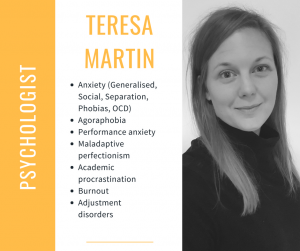Anxiety In Children & Adolescents
[images style=”0″ image=”https%3A%2F%2Fwww.mppsych.com.au%2Fwp-content%2Fuploads%2F2018%2F07%2FTeresa-anxiety-in-children-adolescents.png” width=”560″ align=”center” top_margin=”0″ full_width=”Y”]
[headline style=”2″ font_color=”%23ffbd4a” align=”center” headline_tag=”h2″]Anxiety In Children & Adolescents
[/headline]
One in ten children/adolescents experience anxiety at a level which causes them to have problems doing things (e.g., going to school, trying new things, hanging out with friends, or performing their best). Knowing when to get help for your child can be tough. Worry is both normal and helpful, which is one of the reasons why knowing when it has become a problem can be tricky. Anxiety comes in all different shapes and sizes. Here a few of the most common types we see in kids and teens:
➡ Separation Anxiety – Characterized by excessive worry and distress when separating from ones caregiver in routine, familiar situations (e.g., school or going to a friends house).
➡ Social Phobia – Characterized by excessive fear of negative evaluation or being the centre of attention in social situations.
➡ Generalized Anxiety Disorder – Characterized by excessive and persistent worry regarding several routine things (e.g., doing well at school, not getting into trouble, always being on time, being a good friend, world events, etc).
➡ Specific Phobia – Characterized by excessive worry about a specific object or situation (e.g., high places, needles, dogs, the dark, etc).
➡ School refusal – While not a disorder on it’s own, it can occur as a result of any of the above.
[headline style=”2″ font_color=”%23ffbd4a” align=”center” headline_tag=”h2″]Does Everybody Worry?
[/headline]
Yes, everyone gets anxious. It is both normal and helpful. However, for some, anxiety becomes unhelpful and stops them from doing things. For these kids anxiety happens more often, more easily, and more strongly.
Worry becomes unhelpful when it…
is out of proportion
Jenny worries about failing her maths exam despite never receiving a mark less than 90% on previous exams. She worries so much that she feels sick in the stomach, and has trouble falling asleep for three weeks before the exam.
is more than most
Alex worries about something bad happening to his parents when they’re not together. He worries so much that he cannot go to sleep unless his mum stays with him. Sometimes it takes him a couple hours to fall asleep, and even then, he gets very upset if he wakes up when she’s not there.
interferes with life
Josh is afraid of dogs and it’s getting in the way of him spending time with his friends and family. Josh can’t go to his best friends birthday party because he knows a dog will be there. He has also refused to go on the family holiday because he has heard there might be dogs there.
[headline style=”2″ font_color=”%23ffbd4a” align=”center” headline_tag=”h2″]Recognising Anxiety Disorders In Kids & Teens
[/headline]
Here are a few signs to look for if you’re worried your child or teen might have an anxiety disorder:
➡ Often asks reassurance questions (“Is this right?”)
➡ Stomach aches or headaches
➡ Distressed if a mistake is made or when routine changes
➡ May be disobedient or aggressive to avoid feared situation
➡ Avoids unfamiliar situations. They may become sick or not turn up (e.g. school camps or excursions)
➡ Appears unhappy, can always find a potential danger in a situation
➡ Distress regarding school despite no apparent difficulties
[headline style=”2″ font_color=”%23ffbd4a” align=”center” headline_tag=”h2″]Why Treat Anxiety Disorders? Don’t Kids Just Grow Out Of It?
[/headline]
Anxiety left untreated can lead to low confidence, missed opportunities, and even depression. The good news is, there are things you can do to reduce worries and fears. In fact, everyone can benefit from learning skills to cope with anxiety.
[headline style=”2″ font_color=”%23ffbd4a” align=”center” headline_tag=”h2″]When To Seek Help
[/headline]
➡ If the stress or anxiety symptoms seem much more than peers
➡ If stress or anxiety is leading to avoidance of important activities
➡ If stress or anxiety is causing a lot of distress and/or interfering with daily activities and/or general life goals
[headline style=”2″ font_color=”%23ffbd4a” align=”center” headline_tag=”h2″]Parents – How Can You Help?
[/headline]
➡ Supportive listening
✔ Encourage young people to talk by listening
✔ Empathise with their feelings
➡ Beware of role modelling
✔ Expectations and criticisms
✔ Role model ‘imperfectionism’
➡ Reinforce positive behaviours
✔ Give more attention to what you want to see
➡ Foster independence
✔ Assist young people with problem solving
✔ When it is helpful, step in and be their advocates
➡ Have fun together
✔ There’s nothing more valuable than attention and love
[headline style=”2″ font_color=”%23ffbd4a” align=”center” headline_tag=”h2″]What Now?
[/headline]
If you feel your child or adolescent may be suffering from an anxiety disorder it may be best to seek support from a health professional. If you are unsure about what/who might be best able to support your child/adolescent please give us a call or send us an email. We are more than happy to assist in getting you linked in with appropriate supports.
[button_1 text=”Download%20Article” text_size=”32″ text_color=”#ffffff” text_bold=”Y” text_letter_spacing=”0″ subtext_panel=”N” text_shadow_panel=”N” styling_width=”40″ styling_height=”30″ styling_border_color=”#ffbd4a” styling_border_size=”1″ styling_border_radius=”6″ styling_border_opacity=”100″ styling_shine=”Y” styling_gradient_start_color=”#ffbd4a” styling_gradient_end_color=”#ffbd4a” drop_shadow_panel=”N” inset_shadow_panel=”N” align=”center” href=”https://www.mppsych.com.au/wp-content/uploads/2018/07/Teresa-Helping-Children-Understand-Anxiety.pdf” new_window=”Y”/]
[video_player type=”youtube” style=”1″ dimensions=”560×315″ width=”560″ height=”315″ align=”center” margin_top=”0″ margin_bottom=”20″ ipad_color=”black”]aHR0cHM6Ly95b3V0dS5iZS85ckI4MDJvVkoyWQ==[/video_player]
[headline style=”2″ font_color=”%23ffbd4a” align=”center” headline_tag=”h2″]About The Author
[/headline]

